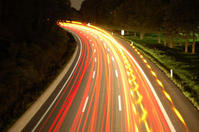| Friday, March 16, 2007 |
| Logic and the Autobahn |
 A minor news item. The EU would like Germany to establish a speed limit on the Autobahn, in order to save gas and limit global warming. And the German's don't like it much, as "free driving for free citizens" is a popular type of slogan, and the absence of a speed limit is a powerful symbol. A minor news item. The EU would like Germany to establish a speed limit on the Autobahn, in order to save gas and limit global warming. And the German's don't like it much, as "free driving for free citizens" is a popular type of slogan, and the absence of a speed limit is a powerful symbol.
And actually they're right about that, and it shouldn't be underestimated. For that matter, the mere existence of the Autobahn is the cause of a certain delight in people all over the world, whether they're ever going to drive on it or not. I'd seen met quite a few Americans who at the mere mention of German freeways would lighten up and exlaim something like "Ah! The Autobahn - the orgasm of freeways!". So, don't discount the value of symbols of freedom. Makes people happy to know that somewhere in the world one can drive as fast as one feels like. But, actually, the point I wanted to make wasn't that, but rather I wanted to comment on the logic behind a policy decision like that, to limit speed in order to burn less gas. It can easily be demonstrated that a car uses less gas at a lower speed. Like, CNN sent a guy out in a BMW to drive fast. And, yes, when he was going 220km/h, and then slowed down to 130km/h, the car's fuel consumption indicator showed that he used half as much gas per 100km distance at the lower speed. And, clearly, if you got everybody to drive slower, some gas would be saved, and there'd be less polution. Not very much less, actually only about 0.6% according to the calculations, as most people really aren't driving 220km/h all the time. Many people will say that it is perfectly logical to limit speeds in order to save gas and produce less polution. But I say that it is perfectly illogical. What you do there is that you pick a target that as a side effect will have the result you're looking for, but which isn't it. See, you're perfectly free to buy an SUV that goes 2km on a liter, and which would use much more gas and pollute much more at 130km/h than more efficient cars would at 220km/h. I'm free to burn as much gas as I want, really, driving alone in my SUV. Point being, if you want to set a rule about using less gas, you should make a rule about using less gas. You know, like, you can't use more than 5 liters of gas per person per 100km. I know many people will not understand what I'm saying, and will say that it is just splitting hairs needlessly, and of course driving more slowly will save gas. But the reason it is worth attention is that it is the same thinking that drives a great many policies and laws that governments make. It is in a similar vein as "We want to protect the children, so therefore we'll monitor everybody's computers". In order to exert an effort towards your aim, you do something entirely different, which amongst its many side effects has one that is deemed related to the stated target. I.e. maybe you'll catch some child molester if you monitor everybody's computers, but you'll also add a lot of new evils into the world. An old comic pops into my mind here. This one guy is stabbing this other guy with a big knife. "Why are you killing me?", he says, "I haven't done anything against you". "Oh, no", the perpetrator says, "no offense, it isn't you, it's the guy underneath you I'm trying to get!". In most places one lives in a society where a lot of laws and rules are there because somebody thought they might have a side effect that is desirable, and the decision was maybe backed by some statistic that showed that indeed it had that side effect. Often lots of other side effects were completely ignored. And most often, the original intent is forgotten too, and it becomes simply laws that somebody else is in charge of enforcing. Like most other drivers, I spend a considerable portion of my mind power worrying about cops and radar traps. Does that make me a better and safer driver? No, that makes me a more nervous and unsafe driver, using my free attention on something that doesn't contribute to better driving in any way. It is perfectly legal to be a lousy and dangerous driver, as long as you have a driver's license. Because the law doesn't enforce safe driving, it enforces things like speed limits, which statistically have been found to have desirable side benefits, but which produce negative side effects for many of the individuals who need to worry about them. Policy makers are often very bad at understanding systems. They will often traffic in fragmented campaigns that will demonstrate that they take a certain issue seriously. Sort of, "We have to at least try to ...". Try to limit polution, lower crime rates, protect children, or whatever. And if they can present a study that says that their new law produced a 5% drop in whatever it was, it would be considered a success. Even though the whole system isn't working any better, and possibly might be working a lot worse in many other ways. [ Politics | 2007-03-16 01:50 | 6 comments | PermaLink ] More > |
| Mohammed, the mastermind |
 Khalid Sheikh Mohammed, the suspected mastermind of the Sept. 11 attacks, confesses to being responsible for just about every terror attack that happened anywhere in the past 10 years. Although there's some concern that maybe he's exaggerating a little bit. Maybe because he was tortured just a little bit. But he says that he for sure was responsible for planning 9/11 "from A to Z". Khalid Sheikh Mohammed, the suspected mastermind of the Sept. 11 attacks, confesses to being responsible for just about every terror attack that happened anywhere in the past 10 years. Although there's some concern that maybe he's exaggerating a little bit. Maybe because he was tortured just a little bit. But he says that he for sure was responsible for planning 9/11 "from A to Z".
Good, I'm really looking forward to hearing how he managed to melt that steel in the foundation of the towers, and for that matter how he brought them down in such a neatly executed demolition, with nothing but jet fuel and burning office supplies. And Building Seven, I'm really looking forward to that explanation. Conveniently bringing down the 47-story building that housed the New York City Emergency Command Center, and the local offices of the State Department, the CIA and the FBI, with nothing but falling debris. Must have been quite a master plan. [ News | 2007-03-16 02:08 | 4 comments | PermaLink ] More > |